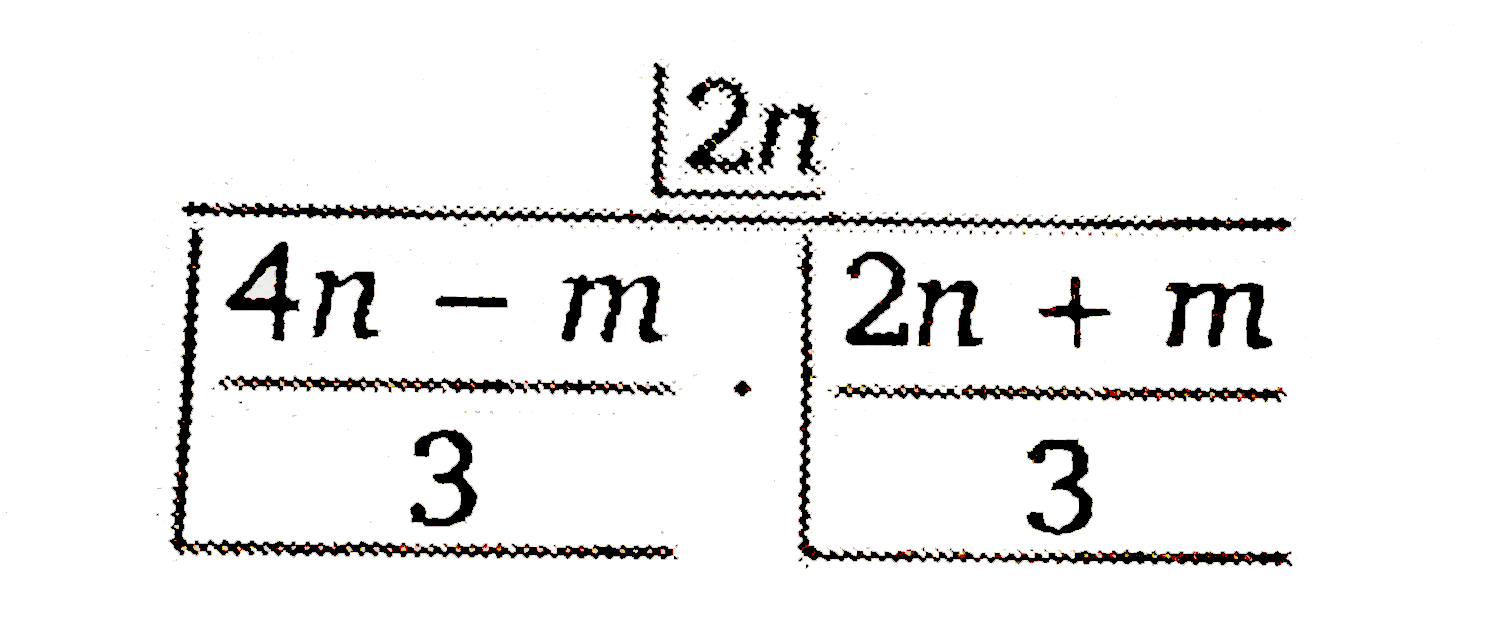The coefficient of xn in the expansion of (1+x)2(1−x)3, is
n2+2n+1
2n2+n+1
2n2+2n+1
2n+2n+2
The correct Answer is:C
To find the coefficient of xn in the expansion of (1+x)2(1−x)3, we can follow these steps:
Step 1: Expand (1+x)2
Using the binomial theorem, we can expand (1+x)2:
(1+x)2=1+2x+x2
Step 2: Expand (1−x)−3
Using the binomial series for negative exponents, we expand (1−x)−3:
(1−x)−3=∞∑k=0(k+22)xk
This gives us the coefficients for xk as (k+22).
Step 3: Combine the expansions
Now, we need to combine the two expansions:
(1+x)2(1−x)3=(1+2x+x2)⋅(∞∑k=0(k+22)xk)
Step 4: Find the coefficient of xn
To find the coefficient of xn, we consider contributions from each term in (1+2x+x2):
- From 1: The coefficient of xn is (n+22).
- From 2x: The coefficient of xn−1 is 2⋅((n−1)+22)=2⋅(n+12).
- From x2: The coefficient of xn−2 is ((n−2)+22)=(n2).
Thus, the total coefficient of xn is:
(n+22)+2⋅(n+12)+(n2)
Step 5: Simplify the expression
Now we simplify this expression:
1. Recall that (n+22)=(n+2)(n+1)2
2. (n+12)=(n+1)n2
3. (n2)=n(n−1)2
Putting it all together:
Total Coefficient=(n+2)(n+1)2+2⋅(n+1)n2+n(n−1)2
=(n+2)(n+1)+2(n+1)n+n(n−1)2
Step 6: Combine like terms
Now we combine the terms:
=n2+3n+2+2n2+2n+n2−n2
=4n2+4n+22
=2n2+2n+1
Final Answer
Thus, the coefficient of xn in the expansion of (1+x)2(1−x)3 is:
2n2+2n+1
Using the binomial theorem, we can expand (1+x)2:
(1+x)2=1+2x+x2
Using the binomial series for negative exponents, we expand (1−x)−3:
(1−x)−3=∞∑k=0(k+22)xk
This gives us the coefficients for xk as (k+22).
Now, we need to combine the two expansions:
(1+x)2(1−x)3=(1+2x+x2)⋅(∞∑k=0(k+22)xk)
To find the coefficient of xn, we consider contributions from each term in (1+2x+x2):
- From 1: The coefficient of xn is (n+22).
- From 2x: The coefficient of xn−1 is 2⋅((n−1)+22)=2⋅(n+12).
- From x2: The coefficient of xn−2 is ((n−2)+22)=(n2).
(n+22)+2⋅(n+12)+(n2)
Now we simplify this expression:
1. Recall that (n+22)=(n+2)(n+1)2
2. (n+12)=(n+1)n2
3. (n2)=n(n−1)2
Total Coefficient=(n+2)(n+1)2+2⋅(n+1)n2+n(n−1)2
=(n+2)(n+1)+2(n+1)n+n(n−1)2
Now we combine the terms:
=n2+3n+2+2n2+2n+n2−n2
=4n2+4n+22
=2n2+2n+1
Thus, the coefficient of xn in the expansion of (1+x)2(1−x)3 is:
2n2+2n+1
Topper's Solved these Questions
- BINOMIAL THEOREM AND ITS APPLCIATIONS BOOK - OBJECTIVE RD SHARMA ENGLISHCHAPTER - BINOMIAL THEOREM AND ITS APPLCIATIONS EXERCISE - Chapter Test
58 Videos
- BINOMIAL THEOREM AND ITS APPLCIATIONS BOOK - OBJECTIVE RD SHARMA ENGLISHCHAPTER - BINOMIAL THEOREM AND ITS APPLCIATIONS EXERCISE - Section I - Assertion Reason Type
13 Videos
- CARTESIAN CO-ORDINATE SYSTEM BOOK - OBJECTIVE RD SHARMA ENGLISHCHAPTER - CARTESIAN CO-ORDINATE SYSTEM EXERCISE - Exercise
27 Videos
Similar Questions
Knowledge Check
The coefficient of xn in the expansion of (1+x)(1−x)n is
An(n2+2)(3n+1)24Bn(n2−1)(3n+2)24Cn(n2+1)(3n+4)24DNone of these
The coefficient of xnin the expansion of
(1+x1−x)2, is
View SolutionThe coefficient of xn in the expansion of (1+x)(1−x)n is
View SolutionThe coefficient of xn in the expansion of loga(1+x) is
View SolutionThe coefficient of x4 in the expansion of (1+x+x2+x3)n
View SolutionThe coefficient of x4 in the expansion of (1+x−2x2)7 is
View SolutionThe coefficient of xn in the expansion of 1(1−x)(3−x), is
View SolutionIf 'n' is a positive integer then prove that the coefficient foxm in the expansion of (x2+1x)2n is :

View Solution
